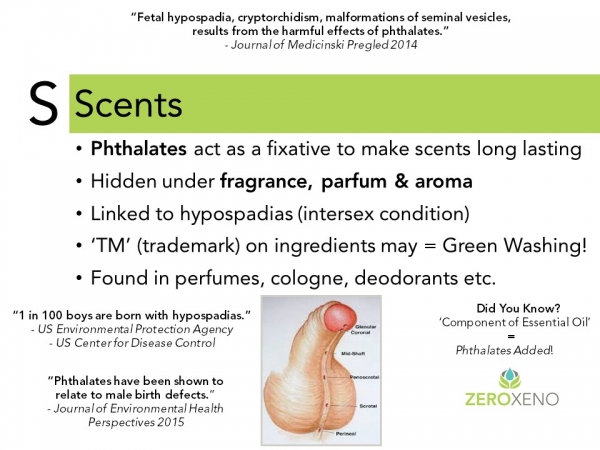Our products are proudly manufactured in Canada and are a product of Canada.
The 7 Deadly Estro-Sins: Scents
December 06, 2019

Have you ever wondered why chemicals that soften vinyl and plastic are in the ingredients of beauty products you use every day? What do scents and your shower curtain have in common? Today we'll discover the answer to these questions and more as we talk about the letter 'S' which stands for scents and softeners in my acronym 'BSFACTS'.
Phthalates in Beauty Products
Phthalates are a class of chemicals used as softeners in modern day plastic products. Unfortunately the cosmetic industry discovered years ago that phthalates not only soften your shower curtain but they help your hair and skin retain a 'soft' look and feel. Phthalates have proven to be very effective softeners in hair conditioners, hairsprays and body lotions.
Phthalates in hair spray allow for gentle movement with exceptional hold but cause genital malformations in baby boys. In lotions, phthalates make your skin moisturized and silky soft. In perfumes phthalates help the scent to be long lasting and lingering. All appealing qualities. After all who doesn't want to smell great, look their best and feel beautiful!
Why Are Phthalates So Bad If They Make You Look So Good?
Is it really such a crime to have plastic softeners in your beauty products? Let's investigate the science behind it all and then you decide for yourself if phthalates are bad for you or not.
Phthalates are known endocrine disruptors and have been associated with birth defects, infertility, lower sperm count, and estrogen dependent cancers. In 2011, the Canadian Government restricted the use of some phthalates in soft vinyl children’s toys. This ban was based on studies that suggest phthalates are hazardous to the reproductive and developmental health of children who handle or chew on phthalate softened toys.
These studies also linked phthalates to liver and kidney failure in young children. It's unfortunate, but worthy to note that the Canadian government has not yet banned the use of phthalates in personal care products.
One particular male reproductive birth defect that is associated to phthalates is hypospadias. According the Environmental Protection Agency (EPA) and the Center for Disease Control (CDC) 1 in 100 boys today are born with this condition and many require surgery to correct this genital malformation. The condition of hypospadias is when the opening of the male infant penis is not at the tip but is located somewhere down the shaft of the penis and/or there are several holes on the penis (watch medical video to learn more about hypospadias).
So What's A Girl To Do?
You may be wondering by now what can be done to avoid phthalates that are so prevalent in personal care products. One solution is to memorize all of the chemical names phthalates have - diethyl phthalate, butyl benzyl phthalate, diethylhexyl phthalate, dibutyl phthalate, dioctyl phthalate, and dimethyl phthalate.
Need a simpler solution? Follow the basic tips below and you will be well on your way to making healthy choices free of xenoestrogens for you and your family!
Tip #1 - Long Lasting = Phthalate Laden
Avoid personal care items where the scent is strong and lasts longer than 15-30 minutes as these products likely contain synthetic chemicals instead of pure essential oils to achieve their fragrant aroma. True essential oils are know as 'volatile oils' which means that once oxygen comes in contact with the oils they dissipate into the air. This dissipation results in a small to non-existent scent of a pure essential oil.
Many companies will try to 'Green Wash' you into believing they are using pure essential oils when in fact what they have done is taint an essential oil with fixatives like phthalates or propylene glycol (a chemical cousin of anti-freeze).
So remember if your favorite products have a strong smell throughout the day, then the likely hood that they contain an estrogenic fixative is very high.
Phthalates can also be hidden under the umbrella of:
-
Fragrance
-
Aroma
-
Perfume
-
Cologne
-
Scent
-
Parfum
-
Trade Mark (TM)
-
Fragrant Oil
-
And so much more...
Remember legally, perfume companies DO NOT have to disclose their full list of ingredients because they are proprietary and top secret, even if they contain toxic substances!
Tip #2 Layers And Levels
If you can’t live without your perfume or cologne, make a conscious choice to apply it to your clothing instead of your skin. This will help reduce your absorption of hormone disrupting phthalates.
Tip #3 'Phth' and 'D'
Okay, so now that you understand how to avoid phthalates in scents and perfumes, what can you do to avoid them as softeners in lotions or hair conditioners? Look for 'phth' on the ingredient label, it’s a dead giveaway that your product contains a phthalate as a softener.
It's also important to look for the abbreviations DEHP, DIDP, DIP and DINP on the list of ingredients as this is another way companies try to 'soften' - sorry pun intended, the chemical names of phthalates.
Tip #4 If It Feels Like Plastic...
If it feels like plastic, it most likely is plastic. Take for instance your hair conditioner. If your conditioner leaves your hair coated with a waxy plastic substance, it’s most likely because it contains phthalates. Hmmm may not such a good choice!
Look for products that list real oils like olive or coconut which naturally absorb into the shaft of your hair instead of coating it with plastic softeners. Products that use real oils are less likely to contain plasticizers like phthalates in their formulations because they have gone the extra mile to use healthy ingredients.
Tip #5 Look For Tubes that Wrinkle/Crinkle
Did you know that many tubes today use phthalates to ensure the tubes bounce back and retain their original shape. One easy way to avoid phthalate softened tubes is to purchase tubes that don't bounce back. In other words look for tubes that when squeezed, remain bent and crinkled. You might remember 10 years ago all toothpaste came in tubes like this.
Tip #6 Avoid Ingredients with a 'TM'
Sadly company's hide phthalates, parabens and many other nasty hormone disruptors in their trademarked ingredients. Trademarks (TM) are used to protect formulation proprietary secrets but unfortunately many brands use 'TM' as a way to hide ingredients they DON'T want you, the consumer to see. In my opinion if a brand is proud of what they put in their products, they should provide full disclosure of all ingredients used. Company's can protect their proprietary formulas by not disclosing the percentages of ingredient they use rather than hiding the actual ingredients themselves.
Check the list of ingredients on your favorite product and decide for yourself if you trust their trademarked secret ingredients or not.
Learn the other letters in my acronym the 'BSFACTS' and switch to natural, organic xenoestrogen-free personal care products today. Your health and hormones will thank you that you did!
Join The Zero Xeno Movement today!
by Bonnie Penner
All Zero Xeno (ZX Enterprises Inc.) products are for external use only. All advice and information posted on this website is from personal research and/or experience and is intended for general educational purposes. Our intent is not to diagnose, treat, cure or prevent any disease. The information on our site is not intended to be a substitute for professional medical advice related to specific medical conditions. We cannot diagnose illnesses nor confirm any claim as to therapeutic safety, effectiveness or course of treatment. Always seek the advice of your physician or other qualified health professionals for any concerns regarding your health. Only your physician can provide specific diagnosis and treatments. Please refer to our full Disclaimer for more details.
- Log in to post comments



